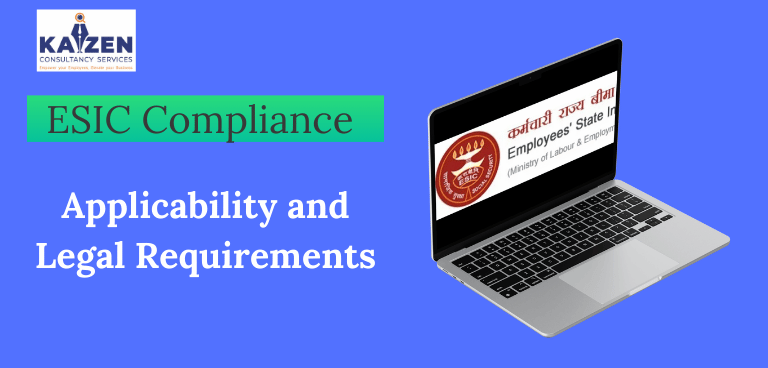ESIC Compliance and Applicability
The Employees’ State Insurance Corporation (ESIC) plays a pivotal role in ensuring social security for workers. If you own a factory in Mumbai that uses power for production, understanding ESIC compliance is essential. Non-compliance can lead to penalties, legal actions, and disruptions in operations. Let’s explore the requirements, industries affected, and the consequences of non-compliance under the ESIC Act. Contact Kaizen Consultancy Services for expert guidance for ESIC Compliance, ESIC Registration online.

ESIC Compliance for Factories Using Power for Production in Mumbai
Under the ESIC Act, factories and establishments meeting the following criteria must ensure ESIC compliance:
- Employ 10 or more workers (some states require 20 workers).
- Use power for production in manufacturing processes.
Power includes electricity, mechanical energy, or other sources essential for operations.
Industries That Use Power for Production
Below is a list of industries in India that typically fall under this category:
- Textile Factories
- Cotton mills and synthetic fabric production units.
- Dyeing, printing, and finishing operations.
- Chemical Manufacturing
- Factories producing paints, adhesives, and cleaning agents.
- Pharmaceutical and cosmetic production units.
- Metal and Machinery Factories
- Foundries involved in metal casting and moulding.
- Units manufacturing industrial tools and equipment.
- Food Processing Units
- Factories producing packaged foods, snacks, or baked goods.
- Breweries, bottling plants, and dairy processing units.
- Electronics and Electrical Manufacturing
- Semiconductor and circuit board production.
- Factories producing electrical appliances and devices.
- Plastic and Rubber Units
- Injection moulding and plastic extrusion processes.
- Tyre and conveyor belt manufacturing.
- Paper and Printing Units
- Factories producing paper rolls, notebooks, and stationery.
- Printing units for packaging and commercial printing.

ESIC Compliance Key Requirements
- Contribution Payments
- Employers must contribute 3.25% of the employees’ wages, while employees contribute 0.75%.
- Contributions should be deposited within the 15th of the following month.
- Maintenance of Records
- Accurate records of employees, wages, and contributions must be maintained.
- Submit mandatory reports, such as accident reports, to the ESIC authorities.
- Timely Reporting
- Report any workplace accidents or injuries immediately to ESIC.
- Notify ESIC of any changes in the number of employees or business operations.
- Display of Notices
- ESIC-compliant establishments must display the ESIC certificate and other required notices in a visible location on the premises.
Penal Proceedings for Non-Compliance
• Employers may face fines for delays in contributions or incorrect filings.
• Penalty interest at 12% to 15% per annum is charged for overdue payments.
• Persistent non-compliance can lead to criminal prosecution under the ESIC Act.
• Imprisonment ranging from six months to two years may be imposed depending on the severity of the violation.
They educate employees about their rights and benefits under the EPF scheme, including how to access their accounts, understand contributions, and file claims.
Employees may lose access to medical care, disability benefits, and maternity support if contributions are not made.

Why ESIC Compliance Matters
Legal Protection: Adhering to ESIC regulations ensures your business operates within the legal framework, avoiding fines and lawsuits.
Employee Welfare: Workers and their families benefit from medical care, financial security during emergencies, and accident compensation.
Business Reputation: Compliance reflects your commitment to employee well-being, enhancing your business’s reputation and fostering a loyal workforce.
Conclusion
ESIC compliance is not optional for factories using power for production. It ensures workers' welfare while safeguarding businesses from legal and financial repercussions. If you own a factory in Mumbai, regular audits, timely contributions, and proper documentation are essential for staying compliant.
Ensure your business aligns with ESIC compliance in Mumbai to protect both your employees and your enterprise.
If you're an enterprise in Mumbai looking to ensure compliance with the Provident Fund, compliance with Act in best possible way, contact the expert team of Kaizen Consultancy Services in Mumbai.
Call us at +91-977 31 50 167 to schedule a consultation and learn how we can assist your business.
